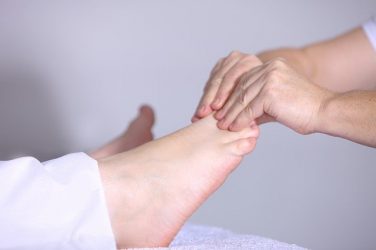Improving circulation in older adults. Circulation problems are common amongst older adults. Here's how to improve circulation.
Living with cirrhosis: risk factors, life expectancy and tips for caregivers.
Cirrhosis is a serious chronic progressive disease that affects the liver.
The on-going disease destroys the liver cells called hepatocytes.
As the disease progresses, the liver becomes scarred. And this scarring ultimately leads to liver dysfunction.
Although cirrhosis can be managed and slowed down, it is a serious illness that can lead to death.
Living with cirrhosis: what causes cirrhosis?
Most people associate cirrhosis with alcoholism.
And while this is a major risk factor for the disease, it’s not the only reason a person might have cirrhosis.
Other causes of cirrhosis include:
- As a complication of a liver infection (hepatitis)
- Exposure to hepatoxins (or chemicals that are toxic to the liver other than alcohol)
- Severe, right-sided heart failure which results in an enlarged and fluid-filled liver
Thus if you have a loved one who has heart disease or has had hepatitis in the past, these could serve as risk factors for cirrhosis too.
How long can you live with cirrhosis of the liver?
Surviving cirrhosis depends on multiple factors including age, the overall health of the person and the cause of cirrhosis.
Thus how long a person can live with cirrhosis will differ from one person to the next.
There are four stages of cirrhosis.
The four stages of cirrhosis
- During stage 1, patients lack energy and constantly feel tired. The liver is inflamed at this point and the individual may have a swollen abdomen. Cirrhosis can be reversed at this stage if a doctor detects it early and the patient makes the right lifestyle changes.
- During stage 2 of cirrhosis, the pressure in the veins surrounding the liver begin to rise. This happens because of an obstruction in blood flow to the liver. This is called portal hypertension. With reduced blood flow and increasing scar tissue, cirrhosis could be slowed at this stage but it may not work.
- Ascites – or fluid accumulation in the belly area – develops during stage 3 of cirrhosis. At this point, the veins are congested and so a lot of fluid gets trapped in the abdomen. More scar tissue develops in the liver. Other symptoms like itchiness, lack of sleep and weight loss happen at this stage. Jaundice also happens at this stage. Jaundice is a yellowing of the skin and tissues that happens because the liver can no longer break down a substance called bilirubin. At stage 3, cirrhosis is irreversible. And at this point, the individual becomes a candidate for a liver transplant.
- The symptoms associated with stage 3 cirrhosis are similar to stage 4. During the final stages of cirrhosis of the liver, confusion, personality changes and hand/muscle tremors become common.
What can you do as a caregiver?
At stages 1 and 2 of cirrhosis, we can still do a lot to slow down the disease.
You can help your loved one make lifestyle changes like:
- Quitting alcohol
- Exercising regularly
- Eating a balanced diet of meals
- Restricting sodium and fluid intake (especially when ascites starts)
- Following medication regimen that is prescribed by a qualified medical provider
- Quitting opioid and narcotic intake
- And even in following medication regimen, make sure you are reading labels to ensure medication will not harm your loved one’s liver.
During stages 3 and 4, cirrhosis is not reversible.
At this point, you can mainly provide supportive care to your loved one as they wait to get a liver transplant.
- For a loved one who is confused, provide a safe environment so they don’t hurt themselves.
- Elevate the head of the bed while they sleep. This reduces shortness of breath.
- Monitoring your loved one’s level of consciousness.
During these stages, it might be time to consider working with professional caregivers so that your loved living with cirrhosis can get the proper care they need.
What is a durable power of attorney and why do you need one?
We’re living through a pandemic.
It is more important than ever for seniors to think about what kinds of medical decisions you want to be made for you in case you cannot make them yourself.
A medical durable power of attorney is document that gives someone else the power to make decisions on your behalf. Of course, this would be in a scenario where you cannot make those decisions yourself.
Although COVID-19 can affect people of all ages and different demographics have recovered from the illness, it is important for older adults to clearly state in writing, who can make decisions for them in case they’re unable to do so.
Even in the absence of COVID-19, accidents, illness and age-related dementia call for older adults to prepare a durable power of attorney.
Selecting a durable power of attorney for healthcare
Nobody can dictate who you choose as your durable power of attorney.
However, we recommend that you choose someone you trust and who is reliable.
It is best if you can work with a lawyer to draft the legal document when you’re appointing the power of attorney.
Can I name more than one person as a power of attorney?
If you live in the United States, you can name more than one person as your durable power of attorney.
However, it is important to specify exactly what each of their roles in decision-making will be.
And whether or not one decision supersedes another should they have conflicting ideas on a medical decision.
We highly recommend that you have a conversation with your lawyer so you can understand the pros and cons of choosing one or multiple powers of attorney.
What happens after I name my medical power of attorney (POA)?
You will work with your lawyer to draft the legal document.
Once it is finished and all the needed signatures are on your document, you can save the document in different places.
- Your lawyers will have a copy.
- You can save a copy in your home in a place where your spouse or named power of attorney knows.
- If you have a personal doctor, you could also ask them to keep one with your medical records.
Having a durable power of attorney long before you need it, can prevent family misunderstandings.
And it will prevent a court of law (instead of your loved ones) from making crucial medical decisions for you.
Also note that, a POA may be called a “healthcare proxy”, “agent” or “healthcare surrogate” depending on where you live.
Read this post where we talk more extensively about estate planning for older adults.
Your elderly loved one is bleeding from the nose and you are worried.
What could be the issue? Why are they experiencing nosebleeds so much?
Nosebleeds in the elderly can happen for the following reasons.
- Dry weather that dries up the nostrils
- Sinus infection
- Aspirin use (if your loved one takes aspirin as part of their medication regimen)
- Blood thinners
- A foreign body in the nose
- Allergies
- Even nasal sprays that treat allergies can also cause nosebleeds
Most of these are not a cause for alarm. And usually, you can resolve a nosebleed by getting rid of the precipitating event.
For most older adults, an occasional nosebleed may be nothing to worry about.
But regular nosebleeds for an older loved one could point to more serious issues like a severely injured nose (due to a fall or another type of accident), coagulation disorders, heart problems, arterial hypertension and some types of cancers.
To stop a nosebleed:
- Get your loved one to sit down and lean forward.
- Pinch the soft part of their nose (or direct them) just above the nostrils and hold it for 10 to 15 minutes.
- You can also place an ice pack wrapped in a towel (or frozen vegetables) over the bridge of their nose.
If a nosebleed lasts for longer than 20 minutes, you should seek immediate medical attention.
Nosebleeds in the elderly – what you can do as a caregiver
Like I mentioned before, you can treat occasional nosebleeds by treating what caused it. Here are steps caregivers can take to treat nosebleeds.
- Make sure your loved one is well-hydrated especially during colder and dryer months. Around winter time, the weather is colder and the air is dry. People tend to have more nosebleeds at this time. Making sure your loved one is hydrated will keep their lips and nose hydrated and prevent bleeding.
- A sinus infection should be treated with the right medications to make sure it does not cause other problems. See a doctor about proper treatment.
- If your loved one is on aspirin or blood thinners, find out from your loved ones’ doctor what they would recommend to prevent and stop the bleeding.
- Minimize the probability of falls around the home to prevent injuries.
Beyond these, it is always to watch out for other changes that have accompanied the nosebleeds.
This will give you clues as to the actions you should take and when it is time to see a medical professional.
The advantages of companions for the elderly.
As loved ones age, you may notice that they increasingly need someone with stay with them.
Because of reduced mobility and health issues, your elderly loved one may have difficulty moving around and performing normal activities like going to the grocery store.
As more and more people age in place – this means more people are opting to live in their homes rather than a nursing home or assisted living community – the need for a sitter or companion may increase.
And this is especially true when you have to go to work and cannot afford to stay home with your loved one to meet their needs.
Having a sitter or companion in this instance is a great idea.
If you’ve noticed that your loved one has reached a point where they could benefit from a sitter/companion, here is what you can expect.
Companions for the elderly: how companions help
Hiring a companion means you don’t have to worry while you’re at work (or if you live apart from them) that your loved one is being helped.
Here are all the ways a companion can help your loved one.
Transportation Assistance
Does your loved one need to get to a doctor’s appointment? A companion can help them get to the appointment. Do they need to get groceries? A companion can help with that too.
At Green Tree Home Care for instance, our companions will drive your loved one to the places they need to go.
To ensure the safety of your loved one, make sure the company you are hiring companions from is licensed and therefore has insurance that covers driving services.
Light housekeeping
If your loved one needs help with their laundry, companions can help with that. If they need help with keeping their house clean, companions can help as well.
Communication assistance
As the years progress the technology to communicate with friends and family also progresses. It can be frustrating for an older person who is not conversant with these technologies to communicate with family when they need to.
A companion can assist your loved one with communication technologies so that they can stay in touch.
Companionship
This is perhaps the aspect that companions and clients alike love the most – the companionship that develops.
As social beings, we crave relationships and the benefits that come with those relationships.
Companions can accompany your loved one to movies, social events, while they are traveling, to exercise and so much more. These meaningful relationships can help the elderly live longer because it gives them a sense of purpose.
Aging in place is possible. And if you find that your loved one needs more help, they want to remain at home and there are few age-related health issues, you should consider a companion for them.
When is constipation an emergency?
Constipation happens when you have difficulty passing stool or when you haven’t had a bowel movement in three days.
Everyone has been constipated at one point. Usually the problem is short-lived.
The causes for constipation include:
- A change in diet
- A diet that contains little or no fiber
- Dehydration
- A lack of exercise
- Certain medications can cause constipation
- Certain conditions that affect the gastrointestinal tract can also cause constipation (an example is irritable bowel syndrome)
- Other medical conditions outside of the gastrointestinal tract like diabetes and lupus can also cause constipation
Normally, constipation is a short-term problem and can be alleviated by lifestyle changes.
For instance, identifying the problem food and eliminating it from your diet can stop constipation.
Adding more fiber into your diet and exercising for at least 30 minutes per day 5 days per week can also help.
Eating fruits like prunes, apples, pears and kiwis prove are effective in getting rid of constipation. If you want to have regular bowel movements, these fruits are helpful as well.
So when does constipation becomes an emergency?
Constipation that is accompanied by intense abdominal pain, vomiting, blood in the stool or severe bloating suggests a serious underlying health condition and you should see a doctor immediately.
Intense abdominal pain and constipation
Regular constipation may be come with some pain.
However when constipation comes with intense abdominal pain, it could indicate:
- appendicitis
- a perforated stomach
- an obstruction (blockage) in the intestine
- reduced blood flow to the intestines
If you or a loved one are experiencing constipation with intense pain, it is important to go to the emergency room immediately.
With these types of emergencies, symptoms progress very quickly and can cause death.
Thus, the sooner you see a doctor the better.
Vomiting and constipation
Fecal impaction happens when your stool is so hard, there is no way it can be passed. In these instance, it also obstructs normal intestinal movement.
This is the cause for vomiting in constipation and it requires immediate medical attention.
Stomach bloating and constipation
If your stomach bloating is painful and you are constipated, this is reason to see a doctor immediately.
Blood in stool and constipation
Passing hard stool can come with some blood in the stool as the hard stool passes through the anus.
This may be minimal and may not be a cause for alarm.
However, if you notice obvious blood, large blood clots or darker colored stools when you are constipated, a more severe problem could be at hand.
A major symptom of colon and rectal cancers is blood in the stool.
This would also be a reason to see a doctor immediately.
Low potassium in the elderly.
Potassium is an important electrolyte that is important for nerve and muscle function in the body.
It helps your heartbeat to stay regular.
Potassium is also important for proper cell function.
Cells in our bodies are constantly moving substances in and out of them – waste products are taken out and important nutrients are brought in for instance.
Potassium is crucial for these functions. Thus, without it, different muscle groups and cell function is impaired.
What causes low potassium in the elderly?
Diuretics
Diuretics are commonly-prescribed high blood pressure medication. People who take diuretics have increased urine production. And with increased urination comes the loss of electrolytes like potassium.
Overuse of laxatives
While the occasional use of a laxative is helpful in getting rid of constipation, it is important not to overuse it.
In fact, overusing a laxative causes diarrhea which results in a large loss of water and electrolytes like potassium.
If you or your elderly loved one is experiencing chronic constipation, it’s important to see a doctor about it.
Malnutrition
Malnutrition is a very common cause of low potassium in the elderly.
Diarrhea and excess vomiting
This can be the cause of low potassium as well.
Kidney disease
Chronic kidney disease will also contribute to a low blood potassium level.
What are the symptoms of low potassium?
When potassium levels fall below a certain level, the individual may experience:
- muscle cramps or twitching
- an irregular heartbeat
- weakness
- fatigue
- constipation (which is why it is important to not overuse laxatives!)
If you notice that these symptoms persist, it’s important to see a doctor immediately.
How is low potassium in the elderly prevented and treated?
Food is the best source of potassium for anyone at any age. And since prevention is always better than treatment, preventing low potassium starts with eating potassium-rich foods.
Here are twenty foods that are rich in potassium.
- Grapes
- Blackberries
- Honeydew
- Bananas
- Oranges
- Cantaloupe
- Grapefruit
- Spinach
- Cucumbers
- Broccoli
- Sweet potatoes
- Mushrooms
- Peas
- Potatoes
- Fish like tuna, halibut and cod are also rich in potassium
- Lima beans
- Pinto beans
- Molasses
- Nuts
- Bran cereal
- Brown rice
- Whole wheat bread and pasta
If a doctor notes through testing that blood potassium levels are very low. And, they might administer IV potassium to your loved one at the hospital.
Since we are not medical professionals, it is important to speak with your doctor if you feel you are experiencing a medical issue. And, doctors can prescribe supplements!
Also, they might treat any underlying disease contributing to this low potassium.
What does a second wave of COVID-19 restrictions mean for you as a caregiver?
News reports over the last week have focused on a second wave of COVID-19 cases.
States like Florida, Texas and Arizona have stopped reopening their states so that they can slow the virus spread.
Los Angeles county which had opened up beaches announced a few days ago, that they would close down the beaches to keep more people from getting infected.
At this point, if you’re exhausted at the thought of this second wave, you’re not the only one.
So what can you do as a caregiver during this time?
In today’s post, I will provide some pointers on how to cope as a caregiver during this second wave of COVID-19 restrictions.
Surviving a second wave of COVID-19 restrictions
Continue to stay safe
A second wave means it is important for us to continue to shelter in place and practice safety measures.
This means that if you care for an elderly loved one who has underlying health risks, it is important to be diligent about:
- Wearing a mask (both you and your loved one) when you go into public spaces where there will be a lot of people
- Avoiding those places where large groups of people gather
- Washing hands for at least 20 seconds with soap and under running water. Do this every time you come into your house from outside.
- Using hand sanitizer especially when you are out in public
Other actions include making sure you and your loved one are consuming enough vitamins and minerals.
Vitamin C for instance is well-known to boost our immune systems.
So while we do our best to stay at home and practice safety measures, make sure you and your loved ones’ immune systems are supported by healthy foods.
Take care of your emotional health
For many caregivers – especially those who are taking care of children as well as elderly loved ones – this has been a challenging time.
Children are home from school and as a caregiver, you have to attend to them.
And with this second wave, it is likely schools will not reopen until 2021.
For a lot of caregivers, this means triple the amount of work as they juggle caring for children, caring for their elderly loved one and staying on top of their work-life.
If this is you, remember to:
- Take care of you as well. As cliche as it sounds, if you’re not taking care of yourself, you won’t be fit to take care of your loved ones. Check out this post to learn self-care tips for caregivers.
- Speak with a mental health professional. These are unprecedented times. Nobody was prepared for this. So it’s okay to talk to someone about how you’re feeling. The great thing here is you get a listening ear and tools to help you cope.
- Hire help if you need it. Green Tree Home Care is available all through this season to support you with our trained staff who abide by COVID-19-related public health rules. Call us today at 800-518-9277.
Bust through the boredom with fun at-home activities
Summer vacation travel plans cancelled? No worries.
There is still a lot you can do to bust through boredom from home. Here are some ideas for you and your household.
- Learn a new skill for work – with so many online learning platforms out there, this is a perfect time to polish up or learn a new skill.
- Practice a new hobby. Remember when you said you wanted to learn how to play the violin? Here’s your chance.
- Discover new books.
- Have virtual parties with distant family.
While these second wave of COVID-19-related restrictions due to rising cases, is NOT fun, we can beat it together.








